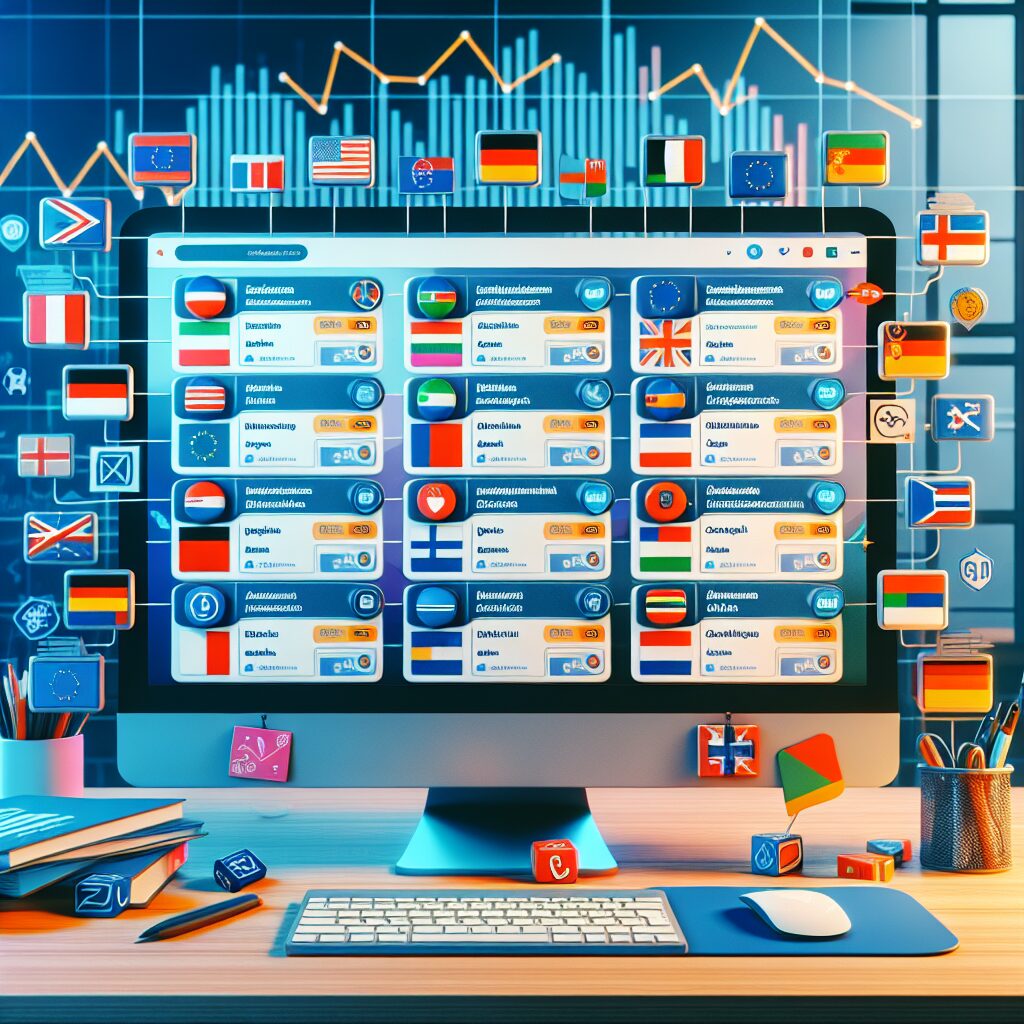About eldris
At Eldris, we automate SEO, multilingual site expansion, and EU compliance for brands scaling across Europe. Our AI-powered platform handles everything from content publishing to regulatory docs—so you don’t have to.
In This Article
- AI tools can automate and enhance key aspects of GDPR compliance, improving accuracy and efficiency.
- AI-powered consent management platforms help ensure valid and traceable user permissions.
- Automated data mapping and DPIAs are critical for risk mitigation under GDPR obligations.
- Challenges like AI bias and model explainability must be addressed proactively.
- Enterprises benefit from embedding privacy by design through AI-driven development strategies.
- Smart audit-readiness solutions reduce regulatory risks and stress on human teams.
- Cross-border data compliance is made easier with AI-enabled geo-location tracking and control.
- Looking forward, AI governance frameworks will shape the way businesses meet privacy regulations.
Why GDPR Compliance Matters in the AI Era
Understanding Data Responsibility
GDPR compliance is essential for businesses operating within or serving clients in the European Union. With AI systems processing vast amounts of personal data, ensuring lawful handling, storage, and usage has become an increasingly complex challenge. Businesses must not only understand the legal obligations outlined by the General Data Protection Regulation (GDPR), but also implement systems that actively uphold data protection principles. AI introduces new dimensions of risk and opportunity, especially in safeguarding user consent, handling profiling, and ensuring data minimisation—core aspects of GDPR compliance. The consequences of non-compliance range from reputational damage to significant financial penalties, making this issue one of strategic importance.

How AI Supports GDPR Compliance
Automating Data Privacy Controls
Artificial intelligence has the remarkable ability to manage repetitive tasks and large datasets with great accuracy and consistency. This capability becomes extremely valuable in enforcing GDPR compliance. Automated privacy controls, powered by AI algorithms, can systematically identify personal data, apply predetermined privacy rules, and continuously monitor adherence. These systems flag potential violations in real-time, allowing rapid resolution before issues escalate. Moreover, AI facilitates active learning; as regulations evolve, so too does the system’s precision in interpreting compliance scenarios. This ensures businesses maintain the integrity of their data governance frameworks while reducing reliance on human oversight.
“AI enables real-time, scalable GDPR compliance by automating privacy checks, consent enforcement, and data management protocols.”
AI-Powered Consent Management Tools
One of the foundational requirements of GDPR is acquiring freely given, specific, informed, and unambiguous consent. AI-powered consent management platforms have emerged to tackle the associated intricacies. These tools can distinguish between different types of data interactions—such as cookies, newsletter subscriptions, or mobile app permissions—and react accordingly in compliance with GDPR guidelines. Users’ preferences are interpreted through natural language processing, and their decisions are recorded in immutable logs to ensure proof of compliance. Furthermore, AI can monitor changes in user behaviour and relative consent status across platforms, prompting proactive notices when fresh consent is required. This not only secures legal integrity, but also builds trust with data subjects.
Data Mapping and Impact Assessments via AI
Under GDPR, both data mapping and Data Protection Impact Assessments (DPIAs) are essential, particularly for high-risk processing activities. AI simplifies and strengthens these operations by automating the discovery and classification of personal data across diverse ecosystems. Machine learning models can scan structured and unstructured data, identifying what qualifies as personal or sensitive information and mapping its flow between systems. Additionally, AI tools can assess the risk profiles of processes, evaluate likelihoods of data exposure, and generate documented DPIAs in alignment with legal expectations. This operational efficiency directly supports GDPR compliance initiatives and provides legal teams with robust, transparent materials for regulatory engagement. Learn more about GDPR & AI Compliance Strategies
Privacy by Design: AI Implementation Strategies
The principle of “privacy by design and by default” lies at the heart of GDPR compliance. AI can play a pivotal role in enforcing this principle during the architecture and development of digital services. Smart systems ensure that all new features integrate privacy protections as a default setting rather than requiring user intervention. Algorithms can be designed to minimise data collection, recommend safe data processing practices, and test new workflows against GDPR benchmarks. When embedded early in the product lifecycle, AI becomes a privacy sentinel, reducing the later cost and complexity of adjustments. Moreover, through reinforcement learning, AI systems can improve their privacy-centric decision making autonomously over time. This proactive approach reflects best-in-class data stewardship and gives organisations a competitive edge in regulatory matters. Read a related article
Challenges in Achieving GDPR Compliance with AI
Despite its strengths, integrating AI with GDPR compliance is not without friction. One critical challenge is explainability. GDPR mandates that data subjects be informed of the logic behind automated decisions affecting them. However, many AI models—particularly deep learning frameworks—operate as black boxes, obscuring interpretability. This poses a direct threat to compliance. Mitigating this issue requires a shift towards explainable AI (XAI), which prioritises both performance and transparency. Additionally, bias management is another concern. AI can unintentionally encode discriminatory patterns, triggering GDPR’s profiling restrictions. Securing adequate training data and implementing bias detection protocols are key. Finally, there’s the issue of accountability. Automated systems must be monitored and governed by identifiable human controllers to prevent legal ambiguity in liability scenarios. Hence, governance frameworks must be updated to manage human-AI interaction responsibly.
Industry Examples: AI & GDPR Compliance in Action
Several industries demonstrate successful integration of AI to maintain GDPR compliance. In the finance sector, banks use machine learning to monitor transactions against anti-money laundering policies while also ensuring that consumer data processing adheres to EU privacy rules. In healthcare, AI anonymises patient records and ensures they are used solely within the agreed scope by cross-verifying consent forms. Meanwhile, e-commerce platforms leverage AI-driven tagging systems that categorise and label user information, prompting tailored consent notifications based on user geography and legal jurisdiction. Tech companies are also beginning to develop AI dashboards that present GDPR readiness scores, helping executives and stakeholders visualise organisational compliance in real time. These examples confirm that AI can be harnessed not only for operational gains, but also for advancing privacy culture throughout the enterprise.
Audit-Readiness and AI-Based Reporting Systems
GDPR requires organisations to demonstrate compliance upon request. This includes maintaining detailed documentation of data processes, consent logs, DPIAs, and breach handling protocols. AI-based reporting systems streamline audit-readiness by automatically capturing and organising these activities across the data lifecycle. With scheduled routines and real-time alerts, AI ensures that all audit trails are current and complete. These systems also generate custom compliance reports formatted for quick review by auditors or the Data Protection Authority (DPA). By offering analytics on data flow, access permissions, and anomaly detection, AI strengthens governance and reduces audit fatigue on human teams. Furthermore, companies employing AI reporting tools are less likely to make errors under pressure, greatly lowering their risk exposure and preserving regulatory trust.
Cross-Border Operations and EU Data Regulations
Cross-border data transfers present heightened GDPR risk, particularly after the Schrems II ruling, which invalidated the Privacy Shield mechanism. AI comes into play by supporting dynamic geo-fencing, data localisation, and real-time monitoring of data transit paths. Intelligent systems can detect where data moves outside of the EU and automatically assess the receiving country’s compliance frameworks. Furthermore, AI observes policy changes and synchronises internal protocols accordingly. This ensures that business continuity is maintained while adhering to GDPR’s strict guidelines on third-country transfers. In addition, AI assists with Standard Contractual Clauses (SCCs) by ensuring the correct legal basis accompanies each transfer and by alerting legal teams when permissions are needed. Ultimately, the capacity of AI to continually assess jurisdictional risk and act autonomously makes it a powerful compliance ally for global entities. View GDPR rules for companies implementing AI
Future of GDPR Compliance: Trends in AI Governance
The convergence of AI and GDPR is ongoing, and future developments are likely to further entrench AI as a key compliance enabler. Emerging trends include the integration of federated learning, which processes data locally rather than centrally to enhance privacy. Also gaining traction is the use of zero-trust data architectures, bolstered by AI to minimise access threats. Regulatory bodies themselves are turning to AI to audit compliance submissions, making accuracy and detail even more important. In the long term, we expect to see the rise of unified AI governance frameworks that combine cybersecurity, data ethics, and privacy standards into centralised protocols. Businesses must prepare to not only comply reactively but adopt a forward-looking stance where AI regulatory evolution is integral to strategic planning. Transparency, clarity, and agility will define the next phase of GDPR compliance in an AI-driven world.
Conclusion: Embrace Smart Compliance Solutions
GDPR compliance remains a critical concern in the AI era, but it can be transformed from a burden into a strategic opportunity. By deploying AI solutions that enhance consent management, automate data mapping, and ensure audit-readiness, businesses can achieve higher standards of privacy protection while reducing manual effort. However, responsible implementation is key—AI tools must be explainable, ethical, and designed with regulatory principles in mind. As digital ecosystems continue to evolve, organisations that leverage smart, AI-driven compliance solutions will be better positioned to maintain data integrity, protect consumer trust, and avoid legal pitfalls. These strategies are no longer optional—they are the foundation of modern, lawful data practice.
Great guide on achieving-gdpr-compliance-key-ai-solutions-for-businesses – Community Feedback
What are the GDPR requirements for AI systems?
AI systems must ensure explicit and informed user consent, conduct Data Protection Impact Assessments, implement privacy by design, maintain transparent records, and provide human oversight.
How do AI solutions help businesses achieve GDPR compliance?
AI tools can automate data mapping, manage consent, monitor data access, and generate compliance reports efficiently to meet GDPR requirements.
Are GDPR regulations applicable to businesses outside the EU?
Yes, any business processing data of EU citizens must comply with GDPR, regardless of their physical location.








